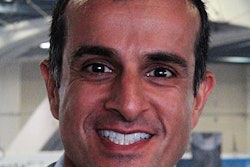
Teresa Yang, DDS, tries to help dentists and patients resolve issues in a timely and nonthreatening manner, focusing on evidence, in her role as chair of the California Dental Association (CDA) Council on Peer Review.
 Teresa Yang, DDS.
Teresa Yang, DDS."Most disputes arise from a breakdown in communication between dentist and patient," Dr. Yang told DrBicuspid.com in an email interview. "Sometimes the parties want to resolve the situation, but they are no longer able to effectively communicate with each other directly."
That's where the peer-review council can come in, helping both sides during what can be a difficult process.
"Some dentists may be unaware that there was a conflict, because a patient may opt to leave a practice rather than have an uncomfortable discussion," Dr. Yang said.
Peer-review advantages
Dr. Yang spoke at the 2016 CDA Presents conference in San Francisco on the topic of managing patient conflicts. When a dentist is unable to resolve a patient situation, the patient can initiate a peer-review case, she said.
According to the CDA's website, the peer-review council of dentist-member volunteers follow "specific procedures to conduct peer reviews of disputes to help all parties involved reach a fair agreement."
There are certain conditions that need to be met for the council to consider a request for peer review, including time since treatment (less than three years) and neither side being involved in litigation over the treatment.
Dr. Yang, who practices in Santa Monica, CA, has been a member of the CDA council for four years and chair for two years. She started as a member and chair of her local peer-review committee and then moved on to the CDA's council.
An important component for council members is the ability to analyze the big picture and recommend policy changes, she said. She also noted the importance of a diplomatic approach as the council reviews cases and interacts with the various parties involved.
Dr. Yang said that while any dentist-patient dispute can be stressful, there are advantages for both parties in resolving the issue via peer review:
“We provide language about how to encourage a patient to initiate a peer-review case so a decision can be made by a third party.”
- There is no cost for the patient.
- The process is confidential.
- The process is evaluative, not punitive. When a treatment doesn't meet guidelines, it is then completed in a satisfactory manner. When the treatment is acceptable, the patient is educated about the treatment.
- Decisions are made by dentists who understand the nuances of dentistry, which isn't always the case in other venues.
Dr. Yang also said the process is more efficient than litigation or arbitration, and the dentist does not lose time away from the office. In addition, if a refund is awarded, the patient signs a release of all claims prior to receiving the refund, she noted.
Mediation available
An initiative the council has been working on for years has recently come to fruition, Dr. Yang added: The council has now added mediation to the peer-review process as of August 1.
"If the dentist is unable to resolve the situation, we provide language about how to encourage a patient to initiate a peer-review case so a decision can be made by a third party," Dr. Yang said.
The idea is to create a mutually beneficial situation.
"If we can insert a neutral third party to facilitate mediation that results in a mutually agreeable outcome, then it's a win-win for both dentist and patient," she said.



















